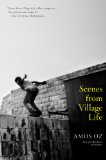Summary | Excerpt | Reviews | Beyond the Book | Read-Alikes | Genres & Themes | Author Bio

Critics' Opinion:
Readers' Opinion:
First Published:
Oct 2011, 192 pages
Paperback:
Sep 2012, 208 pages
 Book Reviewed by:
Book Reviewed by:
BJ Nathan Hegedus
Buy This Book
This article relates to Scenes from Village Life
In the story "Strangers," two characters have a discussion about how writers choose their subject matter. "There are some subjects and motifs that a writer comes back to again and again because apparently they come from the root of his being."
 There is nothing more true that could be said about Amos Oz, Israel's best known novelist and journalist. Having written over 20 books and 450 articles, his work has sought to define aspects of Israeli life. He is considered one of Israel's most influential and well-regarded intellects.
There is nothing more true that could be said about Amos Oz, Israel's best known novelist and journalist. Having written over 20 books and 450 articles, his work has sought to define aspects of Israeli life. He is considered one of Israel's most influential and well-regarded intellects.
Born Amos Klausner in Jerusalem in 1939, his parents were right-wing Zionists who had recently immigrated from Eastern Europe. His father, Yehuda Arieh Klausner, was a librarian and a scholar, and his mother, Fania Mussman, suffered from depression and committed suicide when Oz was only twelve. In an interview with The Huffington Post (2009), Oz describes that time in his life:
"I was very angry with her... I was very angry with my father, I was very angry with myself. I blamed every one of us for the calamity... There was not a drop of compassion in me. Nor did I miss her. I did not grieve at my mother's death. I was too hurt and angry for any other emotion to remain... [it was only] when I reached the age when I could be my parents' parents [that] I could look at them with a combination of compassion, humour, and curiosity."
Forsaking the political beliefs of his father, at only fourteen and a half he went to live on the Kibbutz Hulda in central Israel. Once there, he changed his last name to Oz (which means "strength" in Hebrew), and embraced the labor Zionist way of life. He recollects:
"When I left home at fourteen and a half, I decided to become everything [my father] was not, and not to be anything that he was. He was a right-wing intellectual; I decided to be a left-wing socialist. He was a city dweller; I decided to become a tractor driver. He was short; I decided to become very tall. It didn't work out, but I tried - I tried. So, I assumed the name 'Oz' because this courage and strength are what I needed most."
In compliance with Israel's mandatory military service requirement, in the late 1950s he served in the Israeli Defense Forces, and fought in the Six-Day War (1967) and the Yom Kippur War (1973) as a reserve soldier. In 1960, he married Nily Oz-Zuckerman and, in time, fathered three children with her. As Oz acquired more and more recognition for his writing he was released from much of his field-work at the kibbutz and was allotted more writing time; at its most generous, his weekly schedule consisted of four days of writing, two days teaching, and one day spent on dining room detail.
In 1978, Oz and other social and intellectual activists created a grass roots movement called Shalom Achshav - Peace Now - advocating a two-state solution to the Israeli/Palestinian conflict. Opposed to the building of settlements on the West Bank, Oz considers himself a Zionist, a political liberal, and an economic socialist.
His work is inspired by and deeply rooted in Israeli history - exploring its people, its political turmoil, and the majestic beauty of its biblical landscapes. Over the years, Amos Oz's writings have earned him numerous literary prizes, including the Goethe Prize, the Primo Levi Prize, Tel Aviv University's Dan David Prize, the Ovid Prize, and he has been considered as a candidate to receive the Nobel Prize in Literature.
Filed under Books and Authors
![]() This "beyond the book article" relates to Scenes from Village Life. It originally ran in October 2011 and has been updated for the
September 2012 paperback edition.
Go to magazine.
This "beyond the book article" relates to Scenes from Village Life. It originally ran in October 2011 and has been updated for the
September 2012 paperback edition.
Go to magazine.





The Flower Sisters
by Michelle Collins Anderson
From the new Fannie Flagg of the Ozarks, a richly-woven story of family, forgiveness, and reinvention.

The House on Biscayne Bay
by Chanel Cleeton
As death stalks a gothic mansion in Miami, the lives of two women intertwine as the past and present collide.

The Funeral Cryer by Wenyan Lu
Debut novelist Wenyan Lu brings us this witty yet profound story about one woman's midlife reawakening in contemporary rural China.
Your guide toexceptional books
BookBrowse seeks out and recommends the best in contemporary fiction and nonfiction—books that not only engage and entertain but also deepen our understanding of ourselves and the world around us.